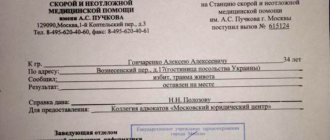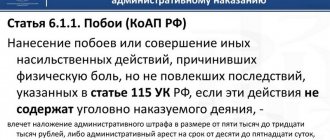ST 116 of the Criminal Code of the Russian Federation.
Beatings or other violent actions that caused physical pain, but did not entail the consequences specified in Article 115 of this Code, committed out of hooligan motives, as well as for reasons of political, ideological, racial, national or religious hatred or enmity, or for reasons of hatred or enmity in in relation to any social group, -
shall be punishable by compulsory labor for a term of up to three hundred sixty hours, or correctional labor for a term of up to one year, or restriction of liberty for a term of up to two years, or forced labor for a term of up to two years, or arrest for a term of up to six months, or imprisonment for a term of up to two years.
Commentary to Art. 116 Criminal Code
1. The objective side of the crime is expressed in the act in the form of an action, which is described in the law using two signs: negative (lack of consequences provided for in Article 115 of the Criminal Code) and positive (action in the form of beatings or other violent actions that cause physical pain).
2. Battery does not constitute a special type of injury. They are actions that involve striking repeatedly. As a result of beatings, for example, abrasions, bruises, and small wounds may occur. However, they may not leave behind any objectively detectable damage. In this case, the forensic medical expert in the conclusion notes the complaints of the examinee, including pain during palpation of certain areas of the body, the absence of objective signs of damage, and does not determine the severity of the harm to health. The fact of beatings is established by the bodies of inquiry, preliminary investigation, prosecutor's office or the court on the basis of non-medical data.
3. Other violent actions that caused physical pain - cutting, pinching, pulling out hair. Animals and insects can be used to inflict physical pain.
4. Alternatively, the mandatory elements of a crime are the victim and the motive for the crime.
The victim may be a close person (note to article). In relation to other victims, liability under Art. 116 of the Criminal Code can only occur if there is one of two alternative motives - hooliganism or the motive of hatred or enmity.
5. The crime is considered completed from the moment the act itself is committed.
Administration of the Krasnogorsk district of the Altai Territory
The Criminal Code of the Russian Federation (hereinafter referred to as the Criminal Code of the Russian Federation) provides for criminal liability for beatings or other violent actions that cause physical pain, which do not entail consequences in the form of minor harm to health. In this case, persons who have committed these crimes out of hooligan motives, as well as for reasons of political, ideological, racial, national or religious hatred or enmity, or for reasons of hatred or enmity towards any social group, are subject to criminal liability.
Responsibility for this crime is provided for in Article 116 of the Criminal Code of the Russian Federation. The punishment in this case includes compulsory labor for a term of up to three hundred and sixty hours, correctional labor for a term of up to one year, restriction of liberty for a term of up to two years, forced labor for a term of up to two years, arrest for a term of up to six months, imprisonment for a term of up to two years. up to two years.
If a crime is committed for other reasons, for example, domestic or in connection with personal hostility towards the victim, liability arises under another article of the Criminal Code of the Russian Federation - 116.1, and only if the guilty person is subject to administrative punishment for a similar act, that is, under Article 6.1.1 of the Russian Code Federation on Administrative Offenses (hereinafter referred to as the Code of Administrative Offenses of the Russian Federation).
By virtue of Article 4.6 of the Code of Administrative Offenses of the Russian Federation, a person who has been assigned an administrative penalty for committing an administrative offense is considered subject to this punishment from the date the decision on the imposition of an administrative penalty enters into legal force until the expiration of one year from the date of completion of the execution of this decision.
That is, a person brought to administrative responsibility under Art. 116.1 of the Criminal Code of the Russian Federation is subject to criminal liability. 6.1.1 of the Code of Administrative Offenses of the Russian Federation, which, from the date of entry into force of the resolution on the imposition of an administrative penalty until the expiration of one year from the date of completion of execution of this resolution, has repeatedly committed a similar act.
Carrying out similar actions after the expiration of the specified period again entails administrative liability.
Article 116.1 of the Criminal Code of the Russian Federation provides for punishment in the form of a fine in the amount of up to forty thousand rubles or in the amount of wages or other income of the convicted person for a period of up to three months, compulsory work for a period of up to two hundred and forty hours, correctional labor for a period of up to six months, arrest for a period of up to three months.
The Criminal Procedure Law provides for three types of criminal prosecution.
Depending on the nature and severity of the crime committed, criminal prosecution, including charges in court, is carried out in public, private-public and private.
Criminal cases concerning crimes under Art. 116.1 of the Criminal Code of the Russian Federation are considered criminal cases of private prosecution and are initiated only at the request of the victim or his legal representative. The victims in this case should contact the magistrate court, since such cases are initiated directly by the magistrate. Accordingly, inquiries and preliminary investigations are not carried out in such cases.
Private prosecution cases are subject to termination due to reconciliation between the victim and the accused. Reconciliation is allowed before the court retires to the deliberation room to render a verdict, and in the appellate court - before the appellate court retires to the deliberation room to make a decision on the case.
Criminal cases of private-public prosecution are initiated only at the request of the victim or his legal representative, but are not subject to termination due to reconciliation between the victim and the accused. Criminal cases of private-public prosecution include criminal cases of crimes provided for, inter alia, by Article 116 of the Criminal Code of the Russian Federation.
There are exceptions to this rule. Part 4 of Art. 20 of the Criminal Procedure Code of the Russian Federation provides that the head of the investigative body, the investigator, as well as with the consent of the prosecutor, the interrogating officer has the right to initiate a criminal case for any crime of private or private-public prosecution and in the absence of a statement from the victim or his legal representative, if this crime was committed in in relation to a person who, due to a dependent or helpless state or for other reasons, cannot protect his rights and legitimate interests. Other reasons also include the case of a crime being committed by a person whose details are unknown.
In such cases, an inquiry or preliminary investigation is carried out in the usual manner, after which the case is sent to the prosecutor for approval of the indictment (act of resolution), and then to the court for consideration.
Deputy Prosecutor
Krasnogorsk district
Counselor of Justice M.M. Lorenz
Second commentary to Art. 116 of the Criminal Code of the Russian Federation
1. The commented article provides for the following condition: the absence of signs of harm to health provided for in Article 115 of the Criminal Code.
Battering - multiple blows. The consequences of these strikes do not have criminal legal significance for the reasons stated above. However, if they resulted in the infliction of light, medium or severe harm to health, the act is qualified under the article of the Criminal Code of the Russian Federation that provides for liability for causing this harm.
Other actions that cause physical pain (one blow, thermal effects, pinching, etc.).
2. The crime is completed at the moment the actions are committed.
3. The subjective side of the crime is characterized by direct intent. A mandatory feature of this crime is a motive: hooligan or extremist (for the content of these motives, see commentary 6 to part two of Article 105 of the Criminal Code).
4. Subject - a person who has reached the age of 16 years.
Currently, liability for beatings is provided for in Articles 116, 116.1 of the Criminal Code of the Russian Federation and Article 6.1.1 of the Code of Administrative Offenses of the Russian Federation.
For the division of responsibility under the above articles, see the publication “Beatings under Art. Criminal Code of the Russian Federation and Code of Administrative Offenses of the Russian Federation. Liability for beatings. Arbitrage practice".
Battery under Article 116 of the Criminal Code of the Russian Federation - cases of private-public prosecution
According to Part 3 of Article 20 of the Code of Criminal Procedure of the Russian Federation, criminal cases of private-public prosecution are initiated only at the request of the victim or his legal representative, but are not subject to termination in connection with the reconciliation of the victim with the accused. Criminal cases of private-public prosecution include criminal cases of crimes provided for, in particular, by Article 116 of the Criminal Code of the Russian Federation (“Battery”).
A criminal case is subject to consideration by a magistrate in relation to a specific person at the request of the victim or his legal representative (Part 1 of Article 318 of the Code of Criminal Procedure). The judge is obliged to accept for consideration the statement of the victim, who is the prosecutor in this case.
Battery under Article 116.1 of the Criminal Code of the Russian Federation is a matter of private prosecution
According to Part 2 of Article 20 of the Code of Criminal Procedure of the Russian Federation, criminal cases of crimes provided for in Article 116.1 of the Criminal Code of the Russian Federation (“Battery by a person subject to administrative punishment”) are considered criminal cases of private prosecution, instituted only at the request of the victim, his legal representative, with the exception of cases provided for in Part 4 of Article 20 of the Code of Criminal Procedure of the Russian Federation, and are subject to termination in connection with the reconciliation of the victim with the accused.
An application for a crime under Article 116.1 of the Criminal Code of the Russian Federation is subject to consideration by a district court.
Beatings under Article 6.1.1 of the Code of Administrative Offenses of the Russian Federation
With a statement about beatings or other violent acts, a citizen is registered with the police.
A police officer is authorized to draw up a protocol on an administrative offense provided for in Article 6.1.1 of the Code of Administrative Offenses of the Russian Federation (Article 28.3 of the Code of Administrative Offenses of the Russian Federation).
Resolution on bringing to administrative responsibility under Art. 6.1.1 of the Code of Administrative Offenses of the Russian Federation is passed by a magistrate, to whom the police official submits for consideration the protocol on the administrative offense and other materials of the case (Article 23.1 of the Code of Administrative Offenses of the Russian Federation).
Removing beatings. Survey
As evidence of beating you, you will need to submit a certificate from the emergency room to the police or court.
You should contact the clinic at your place of residence. Based on the results of the examination, the traumatologist will draw up an examination report, which will contain a brief summary of what happened in your words, list visible injuries (if any), indicate the approximate time of their infliction (more precisely, that the time of infliction of the damage does not contradict what you indicated).
If the beating was inflicted by a citizen known to you due to a domestic quarrel (Article 6.1.1 of the Code of Administrative Offenses of the Russian Federation). Contact the police
We are talking about domestic quarrels among relatives, acquaintances, friends, neighbors, work colleagues, etc. for a variety of reasons (excluding, of course, hooliganism and on the basis of national, religious and other hatred).
In this case, as stated above, you should first go to the emergency room (“remove the beatings”).
Since the last name, first name, patronymic and place of residence of the person who committed the beatings are known to you, there are no obstacles to contacting the police with a corresponding statement to bring a specific citizen to justice.
Please attach a medical examination certificate to your application for prosecution.
An authorized police officer (usually a local police officer) will conduct an inspection of your application, during which he will interview eyewitnesses (if any), add documents from the medical institution to the inspection materials, and attach other evidence (if any).
After the inspection, the police officer will draw up a report on the administrative offense, which, along with other inspection materials, will be sent to the magistrate for consideration. The magistrate makes an appropriate decision in the case of an administrative offense.
Applying for beatings to a magistrate (Article 116 of the Criminal Code of the Russian Federation)
Battering in the presence of certain motives should no longer be classified as an administrative offense, but as a crime under Art. 116 of the Criminal Code of the Russian Federation. In this case, the case is also considered at the request of the victim by the magistrate. The motives entailing criminal punishment in Article 116 of the Criminal Code of the Russian Federation include:
- hooligan urges;
- political, ideological, racial, national or religious hatred or enmity or hatred or enmity towards any social group.
An application to a magistrate to initiate a criminal case of private prosecution must contain the following mandatory details:
- name of the court to which the application is filed;
- description of the crime event, place, time, as well as the circumstances of its commission;
- a request addressed to the court to accept the criminal case for proceedings;
- information about the victim, as well as documents proving his identity;
- information about the person brought to criminal liability;
- a list of witnesses who need to be called to court;
- signature of the person submitting the application.
If the application does not meet the above requirements, the magistrate makes a decision to return the application to the person who submitted it, in which he invites him to bring the application into compliance with the specified requirements and sets a deadline for this.
In case of failure to comply with this instruction, the magistrate refuses to accept the application for his proceedings and notifies the person who filed it.
If the applicant has previously contacted the police with a statement of beatings, it is necessary to file a petition in court to request the preliminary inspection material from the relevant police authority and to include it in the judicial proceedings on the said statement.
If the harm-doer denies guilt at the trial, additional evidence should be presented to the court (as a rule, these are testimonies of eyewitnesses who observed the course of the quarrel, beating, or persons to whom you told about what happened immediately after the incident).
If the causer of harm does not agree with the data specified in the examination report (localization, nature, mechanism and duration of origin of the harm to health), the judge has the right to order a forensic medical examination.
Lack of information about the person who caused bodily harm - contact the police
It is not possible to apply to the court to bring a person to criminal liability for beatings if his details (full name, address) are not known.
If the application does not contain information about the person being prosecuted, the magistrate refuses to accept the application for his proceedings and forwards the said application to the head of the investigative body or the head of the inquiry body to resolve the issue of initiating a criminal case in accordance with Part 4 of Art. 20 of the Code of Criminal Procedure of the Russian Federation, which is notified by the person who filed the application.
As stated in Part 4 of Article 20 of the Code of Criminal Procedure of the Russian Federation, the head of the investigative body, the investigator, as well as with the consent of the prosecutor, the interrogating officer, initiate a criminal case for any crime even in the absence of a statement from the victim, if this crime was committed against a person who, due to a dependent or helpless state, or for other reasons cannot protect its rights and legitimate interests. Other reasons also include the case of a crime being committed by a person whose details are unknown.
In this regard, it is advisable to file a statement of beatings not to the magistrate, but to the police authority, which, as part of the inspection, must find out, among other things, information about the persons who caused the injuries.
If a report about a crime has been received by a law enforcement agency, which, by virtue of the rules on jurisdiction (Article 151 of the Code of Criminal Procedure), does not have the right to initiate a criminal case on it and investigate it itself, then this body is obliged to forward this message along with the materials on jurisdiction attached to it to that the body whose competence includes making a decision on it. For example, if a victim of a crime, the commission of which is being prosecuted as a private charge (causing minor harm to health, beatings), filed a statement to initiate a criminal case to the police, such a statement by law must be accepted, registered and then sent to the court, because that the consideration and resolution of such applications falls within the competence of the magistrate.
Beatings under Article 116.1 of the Criminal Code of the Russian Federation. Are we filing an application to the district court?
Article 116.1 of the Criminal Code of the Russian Federation provides for criminal liability for beatings or committing other violent acts that caused physical pain, but did not entail the consequences specified in Article 115 of this Code, and do not contain elements of a crime provided for in Article 116 of the Criminal Code of the Russian Federation, by a person subjected to administrative punishment for a similar act.
First of all, it should be noted that Federal Law No. 509-FZ dated December 27, 2018 amended Art. 31 of the Code of Criminal Procedure of the Russian Federation, which determines the jurisdiction of criminal cases. Now, the jurisdiction of city and district courts includes criminal cases of crimes with administrative prejudice that precede criminal prosecution for committing crimes provided for, among other things, by Article 116.1 of the Criminal Code of the Russian Federation - battery by a person subjected to administrative punishment for a similar act. Thus, cases under Article 116.1 of the Criminal Code of the Russian Federation should be considered by the district (city) court.
It is obvious that most citizens do not have special knowledge in the field of law and will not be able to correctly qualify the offense at the stage of filing an application for beatings. So, for example, to qualify the actions of the perpetrator under Article 116.1 of the Criminal Code of the Russian Federation, it is necessary that the perpetrator was previously subjected to administrative punishment under Article 6.1.1 of the Code of Administrative Offenses of the Russian Federation (“Beatings”). However, the victim does not have the opportunity to find information about whether the “culprit” was previously subject to such liability or not.
Another example. Sometimes the motive behind the actions of the perpetrator of the beatings is far from obvious. At the same time, the qualification of the act and the assignment of the case to consideration by a magistrate under Art. 116 of the Criminal Code of the Russian Federation.
In case of any assault, we recommend contacting the police.
In the event of bodily harm in the form of beatings or other violent actions, regardless of the obvious motives for the commission and other circumstances, we recommend contacting the police, as we indicated above. An authorized police officer is obliged to check the application and establish at least the minimum circumstances necessary for the case to be considered by the court (full name, address of the perpetrator, information about the previous bringing of the perpetrator to administrative or criminal liability, possible motives for committing the act).
In accordance with Article 145 of the Code of Criminal Procedure of the Russian Federation, based on the results of consideration of a report of a crime, the body of inquiry, the inquiry officer, the investigator, the head of the investigative body makes one of the following decisions: on the transfer of the report under jurisdiction in accordance with Article 151 of this Code, and in criminal cases of private prosecution - in court in accordance with part two of Article 20 of this Code.
Thus, police officers are obliged to accept and verify any appeal, including those with signs of a crime in a private prosecution case, and, having found out that it is not within their jurisdiction, forward it to the magistrate (Clause 3, Part 1, Article 145 of the Code of Criminal Procedure of the Russian Federation) .
We further recommend the article: “Beatings. Let's contact the police"
- We also recommend: “Battery intentionally and through negligence”, “Single blow – beating? Judicial practice", "Complaint about a crime to the police"
We recommend other publications in the review “Beatings and harm to health. Responsibility. Arbitrage practice"
How to remove the beating and write a statement?
Criminal liability for beatings occurs only upon a statement from the victim, if there is evidence of systematic application of blows to the victim’s body. Due to the fact that beatings, which are provided for in Article 116 of the Criminal Code of the Russian Federation, do not entail harm to health, only a timely contact with law enforcement agencies will allow recording possible traces of blows.
Where can beatings be recorded? The victim's action algorithm will consist of the following steps:
- immediately after the fact of violent acts, contact the police;
- file an official complaint about assault;
- obtain a referral for a medical examination for battery;
- obtain an official medical document confirming the presence of impact marks and submit it to the department of the Ministry of Internal Affairs.
Why is it necessary to apply for a referral for examination? Despite the harmless nature of the beatings, examinations often reveal evidence of more serious injuries and injuries. In this case, law enforcement agencies will not apply Art. 116 of the Criminal Code of the Russian Federation for beatings, and another for a crime against the person.
How is a medical examination carried out after a beating?
Punishment for beatings occurs only if there is reliable evidence of the use of physical force and blows, the motives of the offender, as well as the nature of the damage and health consequences. To this end, authorized medical personnel will record the nature of the complaints according to the victim, and will also conduct a detailed examination of the injuries on the citizen’s body.
If necessary, various additional procedures may be prescribed to determine the exact composition and nature of the health consequences. All results of the examination will be duly recorded in an official certificate, which will serve as evidence in a criminal case. You can read more about the evidentiary procedure in our previous article about the penalties for light battery.
Where can I film the beating?
When filing an application with the police, a citizen will receive a referral for a medical examination to a medical institution that has a license for the specified types of activities. As a rule, police officers have information about medical clinics or medical examination offices where appropriate examinations can be carried out.
Find out more Punishment and statute of limitations for causing death
How to remove a beating without a statement? In some cases, it is advisable to immediately contact a medical facility to make sure that there are no serious consequences for health and to record traces of impacts. Every victim has this opportunity, and the police must accept the proper official document as evidence.
Decriminalization: amendments to the Criminal Code of the Russian Federation and the Code of Administrative Offenses of the Russian Federation
Home Press center Decriminalization: amendments to the Criminal Code of the Russian Federation and the Code of Administrative Offenses of the Russian Federation
At the beginning of July, a package of amendments aimed at humanizing criminal legislation came into force (federal laws No. 323-FZ and No. 326-FZ dated July 3, 2016). Among the most significant innovations: decriminalization and the introduction of administrative prejudice in relation to a number of acts, as well as the introduction of the institution of exemption from criminal liability with the imposition of a court fine.
Firstly, administrative liability has now been established for the first beating without qualifying criteria, and if it is committed by a person who has previously been subjected to administrative punishment for a similar act (according to Article 4.6 of the Code of Administrative Offenses of the Russian Federation, a person who has been given an administrative punishment for committing an administrative offense is considered subjected to this punishment from the date of entry into force of the decision on the imposition of an administrative penalty until the expiration of one year from the date of completion of execution of this decision) – criminal (see Art. 116.1 of the Criminal Code of the Russian Federation). At the same time, the rule on administrative prejudice does not apply to beatings committed against loved ones or for reasons of political, ideological, racial, national or religious hatred, as well as for reasons of hatred or hostility towards any social group: they are still considered initially criminally punishable.
Secondly, evasion of alimony payments has been decriminalized (Article 5.35.1 of the Code of Administrative Offenses of the Russian Federation); At the same time, criminal liability was introduced for repeated commission of such an act (Article 157 of the Criminal Code of the Russian Federation as amended).
Thirdly, thefts that resulted in damage up to 2,500 rubles were transferred to the category of administrative offenses. (previously, thefts that caused damage up to 1,000 rubles were considered administratively punishable). At the same time, administrative liability is now differentiated depending on the size of the stolen property - up to 1000 rubles. and from 1000 rub. up to 2500 rub. At the same time, administrative prejudice was introduced for cases where a person again commits theft in the amount of 1,000 to 2,500 rubles, having previously been subjected to administrative punishment for a similar act: now the perpetrator is already brought to criminal liability under Art. 158.1 of the Criminal Code of the Russian Federation. Also up to 5000 rub. The minimum amount of damage at which it can be considered significant for qualifying an act under paragraph “b” of Part 2 of Art. 158 of the Criminal Code of the Russian Federation.
Already in the first days of the novelties, the question arose about whether it was possible to bring a person to administrative responsibility, for example, for beatings that were inflicted in the period before the decriminalization package came into force. Provisions on the operation of the law in time, provided for in Part 1 of Art. 1.7 of the Code of Administrative Offenses of the Russian Federation, do not provide grounds for a positive answer to this question: “A person who has committed an administrative offense is subject to liability on the basis of the law in force at the time the administrative offense was committed.” Thus, since before the decriminalization package came into force, administrative liability for beatings was not provided for, it is unacceptable to extend the new amendments to the Code of Administrative Offenses of the Russian Federation (Article 6.1.1 of the Code of Administrative Offenses of the Russian Federation) to “old” beatings. As a result, for victims of beatings in the pre-reform period, the only option left to protect their rights was to apply through civil proceedings for compensation for damage caused and compensation for moral damage.
In addition to decriminalization, the Criminal Code of the Russian Federation introduced the institution of releasing persons who have committed crimes of minor or moderate gravity for the first time and have compensated for the damage caused by the crime from criminal liability with the imposition of a court fine, the amount of which cannot exceed ½ the amount of the fine provided for as a type of punishment in the sanction of the article of the Special Part of the Criminal Code of the Russian Federation, or 250,000 rubles, if the sanction of the article of the Special Part does not provide for punishment in the form of a fine.
The full text of the article was published in the newspaper “Ezh-Lurist” No. 34 dated 09/02/2016 and on the website “Economy and Life”.
If you need the help of a lawyer in criminal, family, or civil law, you can call 8-910-188-73-21 or write by email or telegram.
8-910-188-73-21 all methods of communication
What does assault mean?
The criminal legal characteristics of beatings are regulated by Article 116 of the Criminal Code of the Russian Federation. However, this norm does not contain a clear definition of this illegal activity. Based on the analysis of criminal law and judicial practice, battery consists of systematically (multiple) striking any part of another person’s body using arms, legs or foreign objects.
The key difference between beatings and other types of bodily harm, based on the meaning of Art. 116 of the Criminal Code of the Russian Federation, is the absence of any harm from these illegal actions. Physical manifestations of battery may include minor injuries in the form of bruises, scratches or abrasions that cause only short-term pain to the victim.
Are beatings and assault the same thing?
The process of beating is called assault, although pain can be caused not only by force of the hands. Therefore, these terms are actually equivalent, however, criminal law contains an expansive description of assault - Art. 116 of the Criminal Code of the Russian Federation includes both beatings and other actions that did not cause even slight harm to health.
The criminal characteristics of beatings include the mandatory presence of the following motives:
- hooligan urges;
- racial, political, religious hatred and other similar motives;
- enmity or hatred towards a particular social group.
Note! In the absence of the specified motives, beatings in the sense of Article Art. 116 of the Criminal Code of the Russian Federation do not arise. For example, domestic assault is not included in the concept of beatings under Art. 116 of the Criminal Code of the Russian Federation.
Let's consider the procedure for the victim's actions - how to remove the beatings and prove the systematic infliction of blows.
Find out more Defense in drug cases at the investigative stage
Responsibility for beatings
Let's consider what the penalty for assault is, based on the content of Article 116 of the Criminal Code of the Russian Federation. The list of possible sanctions includes:
- compulsory work lasting up to 360 hours;
- correctional labor for up to one year;
- forced labor for a period of up to two years;
- arrest up to six months;
- imprisonment for up to two years.
The choice of one of these sanctions will be made by the court based on the nature and circumstances of the crime. It should also be noted that the article in question does not provide for independent punishment for beatings by a group of persons, since other qualifying criteria are not included in this crime.
If you have any questions or need help in bringing to justice for assault, please contact our lawyers for a consultation. We will explain the rules of law and judicial practice, help you fill out an application, and provide other services in the framework of a criminal case. Contact us, we will find a way out even in the most difficult situation!
How to fill out and submit a report of battery to the police
Punishment for beatings under Article 116 of the Criminal Code of the Russian Federation is assigned based on the results of the investigation and consideration of the criminal case. In order for the police to officially begin an investigation and initiate a case, the application must indicate:
- personal data of the applicant, who will subsequently be recognized as a victim;
- information about the potential criminal, if his identity is known to the victim;
- a detailed description of the identity of the attacker;
- a list of eyewitnesses and witnesses who can confirm the stated facts;
- a detailed description of all the circumstances of the strikes - place, time, cause of the conflict, etc.;
- description of the number of blows and their nature;
- request for criminal prosecution.
Before writing an application, it is advisable to consult with a lawyer who will advise you on the procedure for filling out the document. The completed form must be officially registered in the KUSP (Crime Reporting Book), for which a receipt will be issued.
How does a lawyer work when representing the interests of a victim?
The person who was beaten acts as a victim in the proceedings. The legislator does not provide for the possibility of providing him with a public defender. If a qualified private lawyer appears on the defendant's side, the court will most likely rule in his favor. To prevent this from happening, the victim, like the accused, will need the help of a professional human rights defender.
When working with a victim, a criminal defense lawyer can:
- obtain compensation for physical and moral harm caused to the client;
- convince the court of the need to apply one or another measure of influence to the accused (in agreement with the client).
Legal services under Art. 116 of the Criminal Code of the Russian Federation
The list of services provided by a lawyer under Art. 116 of the Criminal Code of the Russian Federation, includes:
- preliminary consultation;
- familiarization with the case materials;
- analysis of all the circumstances of the current situation and development of a legal position on it;
- preparing the client to participate in interrogations and personal presence during interrogations;
- choosing a strategy to protect the interests of the suspect (accused) or victim;
- checking the information collected by victims and searching for new evidence confirming the client’s case;
- representing the client's interests in court;
- filing petitions, complaints, claims, etc.;
- appealing a judicial decision in a higher court (appeal or cassation).
The listed services can be provided both in combination and separately.
How much does a lawyer cost?
If you need a lawyer (you or you were beaten), you may be interested in how much the services of a qualified human rights defender cost in Moscow. It is possible to calculate the exact cost of the service only after studying all the case materials, as well as determining the list and scope of work that the lawyer will need to perform when working with the client. When setting the price, the following factors are taken into account:
- time spent by the specialist working on the case;
- urgency of service provision;
- the stage at which the criminal case is being considered;
- the presence of aggravating circumstances;
- the nature of the damage caused as a result of the beating;
- type of service (comprehensive or one-time).
How does a lawyer work when defending the interests of the accused?
Independently protecting your interests during criminal proceedings is a risky endeavor.
The lack of the necessary theoretical knowledge and experience of interaction with representatives of investigative and law enforcement agencies, the prosecutor's office and the court will play into the hands of the opposing side - the likelihood that the judge will take its side increases significantly. Only a professional lawyer can ensure the protection of the interests of a participant in criminal proceedings and compliance with all requirements of legality and fairness. Depending on the circumstances of the case, a lawyer in criminal cases initiated under Article 116 of the Criminal Code of the Russian Federation (assault) may choose one of the following strategies for defending a client accused of committing a crime:
- the client is declared innocent and completely released from criminal liability (for example, beatings can be reclassified as self-defense);
- changing the status of the accused to the status of a witness;
- reconciliation of the parties;
- application of the mildest sanction, which is provided for in Article 116 of the Criminal Code of the Russian Federation (for example, replacing arrest with compulsory work).










